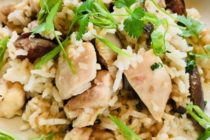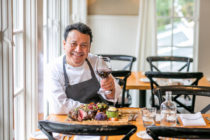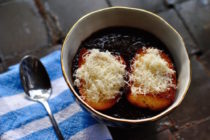Tea eggs, soy sauce eggs, marbled eggs: Whatever you choose to call them, they are a delicious twist on ordinary hard-boiled eggs.
A tea egg is, essentially, a hard-boiled egg that is lightly cracked all over and then cooked a second time in a broth made of tea, soy sauce, five-spice powder or any of a variety of other seasonings. The dark broth during the second cooking and the cracks yield a beautiful marbled finish when the egg is shelled. The broth also adds a punch of flavor to the egg white.

Start with hard-boiling eggs with whatever method you prefer.
Tea eggs are commonly eaten as a snack. They are probably Chinese in origin, but like so many other foods, have spread throughout Asia where they are sold in convenience stores and by street vendors. Here in Houston, we spotted cartons of them at the big Asian supermarkets.
But tea eggs are easy to make, so why not try it yourself? This is a fun project to make with kids, as each egg will have a unique pattern when it is shelled.

Create a marinade using tea, spices and soy or fish sauce.
Eat the resulting eggs as is – they’re great for lunch boxes – or make them into deviled eggs. If you make ramen at home, they are a special treat when sliced in half and nestled among the noodles in the broth.

Crack the shells on your hard-boiled eggs before soaking them in the tea marinade.
Decades of dying Easter eggs made me the ideal candidate for trying my hand at making tea eggs. Naturally I turned to the internet for inspiration and a recipe. I used this recipe as my starting point, but I made a dozen tea eggs rather than just six. (The recipe yields plenty of broth to flavor 12 eggs, though you might need to stretch it with a little more water.) Be sure to read JYY’s comments at the end of this post.
Based on my experience with this recipe, here are a few notes and tips:
- We sampled our tea eggs warm from the broth, at room temperature and cold from the refrigerator – and that was our order of preference: delicious warm, good at room temp and okay chilled.
- The long cooking of the hard-boiled eggs will yield the dreaded gray-green ring around the cooked yolk. We Westerners are always exhorted by cookbooks to avoid that by rapidly chilling the cooked eggs. That’s not possible here. Just accept it. It’s perfectly safe to eat.
- Don’t be shy about cracking the eggs, as it just lets in more flavor and makes the patterns prettier. Crack ’em all over!
- I made the tea eggs from chicken eggs, but I can’t think of any reason why you couldn’t also do it with duck eggs.
- Store tea eggs in their shell until ready to eat so that the egg whites don’t dry out and get rubbery.

Depending on the marinade you make, your eggs may be dark brown or light beige.
It’s a simple recipe, with hands-on time of only about 10 minutes. The rest of the time the eggs boil or marinate without you watching them.
One final note: Next time I make these, I will leave them in the cooled broth to marinate longer, like overnight. I liked the haunting flavor that the soy sauce, star anise and other ingredients gave to the eggs.

The inside of a finished tea egg.









Follow Us